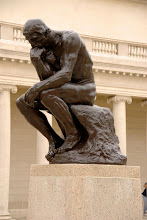The opening chapters of Luke are so well known that it seems unlikely to find anything that won't seem redundant for this series. After all, this is the Christmas story. But when you take a closer look, a theme comes into play, a theme that is prevalent in Luke's narrative. I refer to the theme of "putting things right."
One of the curious questions we can ask looking at the Gospels is where the words "good news" first come into play. On this end of Christian history, we think of the word "gospel" and immediately have a variety of concepts that come to mind. For the Gentiles that read Luke, however, the "good news" of his Gospel was a mystery. What was the good news? We can imagine how it would be if someone in today's world wrote a bestseller entitled "Good News for Your Life". Picking up the book, we would expect to find out what it was about at a glance. The first or second page would give us the basic idea. However, with the Gospels, we tend to read them as if they were written for those with a prior knowledge of Christianity. We forget that most of the Biblical writers were seeking to communicate something difficult and unimagined by his audience.
Luke, interestingly enough, first uses the words "good news" in association with the birth of John the Baptist. "I am Gabriel," declares the angel "who stands in God's presence, and I have been sent to you and bring you this good news." Zechariah, of course, doesn't believe him, and is struck silent. He is the first example of unbelief in the face of the Gospel. Again, Gabriel appears to Mary and proclaims that she will be the mother of the Messiah. The earth shattering background in both circumstances (sometimes lost on our credulous ears, certainly not on first century ones) is the virginity of Mary and the barrenness of Elizabeth. God's modus operandi sends an implicit signal about what kind of prophet and Messiah he is introducing onto the world stage. It will be a King who overthrows and undermines the unfruitful womb of Earth and implants his own Kingdom in its place.
To grasp the immediate impression that the Good News gave to those who first heard it, a correlative is needed. Unfortunately, we don't have many mythical leaders to look to in our past. But let us imagine that an angel were to come announcing the return of King Arthur and with him, the redemption of Western Civilization. The sense of expectancy, hope, and rising anger against the current corrupt order would be enormous. The "good news" of Arthur's return would be juxtaposed to the evil seen all around us.
Clearly, the Gospel of Jesus' Incarnation was received by those who heard it as a challenge to evil on every level. Mary's Magnificat, Zechariah's Benedictus, Simeon's prophecy about the "rise and fall of many in Israel", the fears of King Herod, and the prophecies of the Magi; the examples are numerous. Again and again the emphasis is on the confrontation between the Heir of David and his right hand man against the forces of evil. This evil is not just political and social, but is the intrinsic cancer that has eaten away at the root of creation. Thus the great meaning in the manner of God's entrance into history.
As we shall see, the Gospels quickly take this conflict to an epic level. The forces of evil present in the Gospels are far beyond anything seen in the Old Testament. Clearly the incarnation of God himself is a threat only Satan himself can be allowed to address...
Sunday, September 27, 2009
Subscribe to:
Post Comments (Atom)










No comments:
Post a Comment